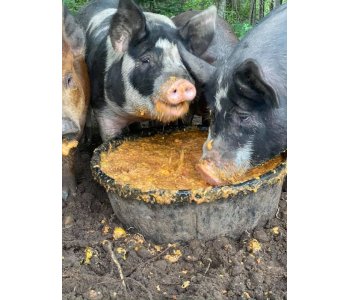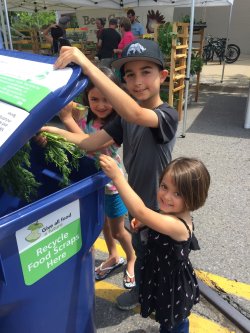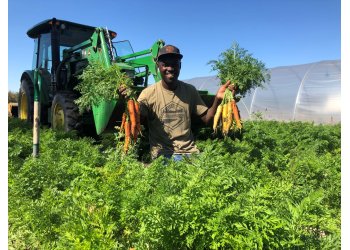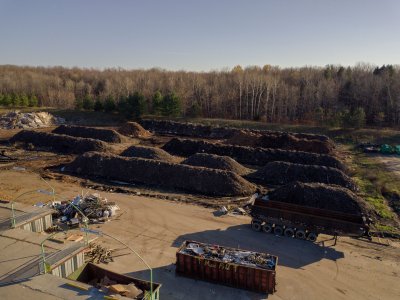Table to Farm: 3.3 Million Pounds of Food Scraps
 Table to Farm: Bringing 3.3 million pounds of food scraps full circle
Table to Farm: Bringing 3.3 million pounds of food scraps full circle
March 13, 2023 Media Release
 The Emmet County Recycling (ECR) food scrap collection pilot program started with 18 eager businesses and less than 100,000 pounds collected in a three month period. It has grown tremendously with collections now topping 600,000 pounds annually from 39 businesses. In the last two years, we have doubled our grand total – from 1.6 million to 3.3 million!
The Emmet County Recycling (ECR) food scrap collection pilot program started with 18 eager businesses and less than 100,000 pounds collected in a three month period. It has grown tremendously with collections now topping 600,000 pounds annually from 39 businesses. In the last two years, we have doubled our grand total – from 1.6 million to 3.3 million!
Since its inception in 2015, businesses and community members have contributed over 3.3 million pounds, as well as pre and post-consumer food scraps via curbside and community cart collection. These scraps have been diverted from landfill, made into ECR compost, and placed back into the circular economy for farms, gardeners, and local road construction projects. When food waste is landfilled, it will decompose anaerobically, releasing methane, a greenhouse gas that contributes to climate change. When these valuable scraps are composted with yard waste and leaves, it is made into compost with the power to capture greenhouse gases and sequester carbon in the soil. The cycle continues!
In 2022, ECR saw significant growth in the collection program from the Iron Horse Café at North Central Michigan College, as well as the Little Traverse Bay Bands of Odawa Indians governmental building. Both groups saw upwards of 130% growth since 2021. The Harbor Springs IGA, Manna Food Project, Boyne Highlands and Petoskey High School made great strides in their respective programs and contributed a whopping total of 86,775 pounds to the scrap collection program.
Leading contenders in the volume category include our local zero waste trifecta, Tap 30, Pour and the Backlot in the restaurant categories for a total of 177,109 pounds. A.R. Pontius Flower Shop, as well as Monarch Garden & Floral Design are both knocking it out of the park with the sheer quantity of floral scraps, diverting 30,705 pounds and 50,053 pounds, respectively.
 The Give All Food A Future (GAFAF) residential community collection drop-offs have made noteworthy progress this year, which displays the dedication our neighbors possess reducing their waste streams by recycling organics. Locations for community members to get involved are behind City Park Grille, Julienne Tomatoes and The New York in Harbor Springs, as well as the Pleasantview Drop Off Center. Seasonal GAFAF carts are accessible to the public in both Petoskey and Harbor Springs at the weekly Farmer’s Markets.
The Give All Food A Future (GAFAF) residential community collection drop-offs have made noteworthy progress this year, which displays the dedication our neighbors possess reducing their waste streams by recycling organics. Locations for community members to get involved are behind City Park Grille, Julienne Tomatoes and The New York in Harbor Springs, as well as the Pleasantview Drop Off Center. Seasonal GAFAF carts are accessible to the public in both Petoskey and Harbor Springs at the weekly Farmer’s Markets.
Although it can be intimidating initially, recycling your food or floral scraps at home can be very simple. Make or purchase a small container for your kitchen counter and place it near your trash receptacle for mindful waste diversion. A five gallon bucket can be a great collection point until you’re ready to take it to a nearby GAFAF cart. Repurposing the food waste from your home refuse can cause a significant dip in your monthly garbage bill (terrible side effect, I know). If you’re looking to take it further, our website EmmetRecycling.org offers great tips for starting your very own compost pile at home. Commercial entities interested in curbside service can call the Emmet County Recycling office for more information 231.348.0640.
The next step in closing-the-loop with food waste is with the use of our locally generated, independently tested and screened compost. Between raised garden beds, hoop houses, container gardening, landscaping in and around buildings, planting trees and bushes and re-seeding of lawns, our compost has no limitations to its usage and is far better at growing and sustaining plant life than topsoil. ECR compost can be purchased at the Pleasantview Drop Off Center in Harbor Springs by the bag or by the load; the right quantity for any sized project.
Diverting 627,508 pounds of floral and food scraps in one year sounds incredible, but how do we put that into perspective to know we are making a difference? When punching these numbers into the Environmental Protection Agency (EPA) Waste Reduction Model (WARM), we find that diverting this amount would be the equivalent to removing 101 passenger vehicle emissions from the road for an entire year. Not convinced? If we didn’t divert from landfill, it would be similar to consuming an additional 19,733 cylinders of propane. Imagine the exponential possibilities if we all do our part to conserve our resources for future use.
The future is bright in the recycling realm. Become a member of the circular economy with food and floral scrap recycling. It’s not too late to make a big difference with little effort.
